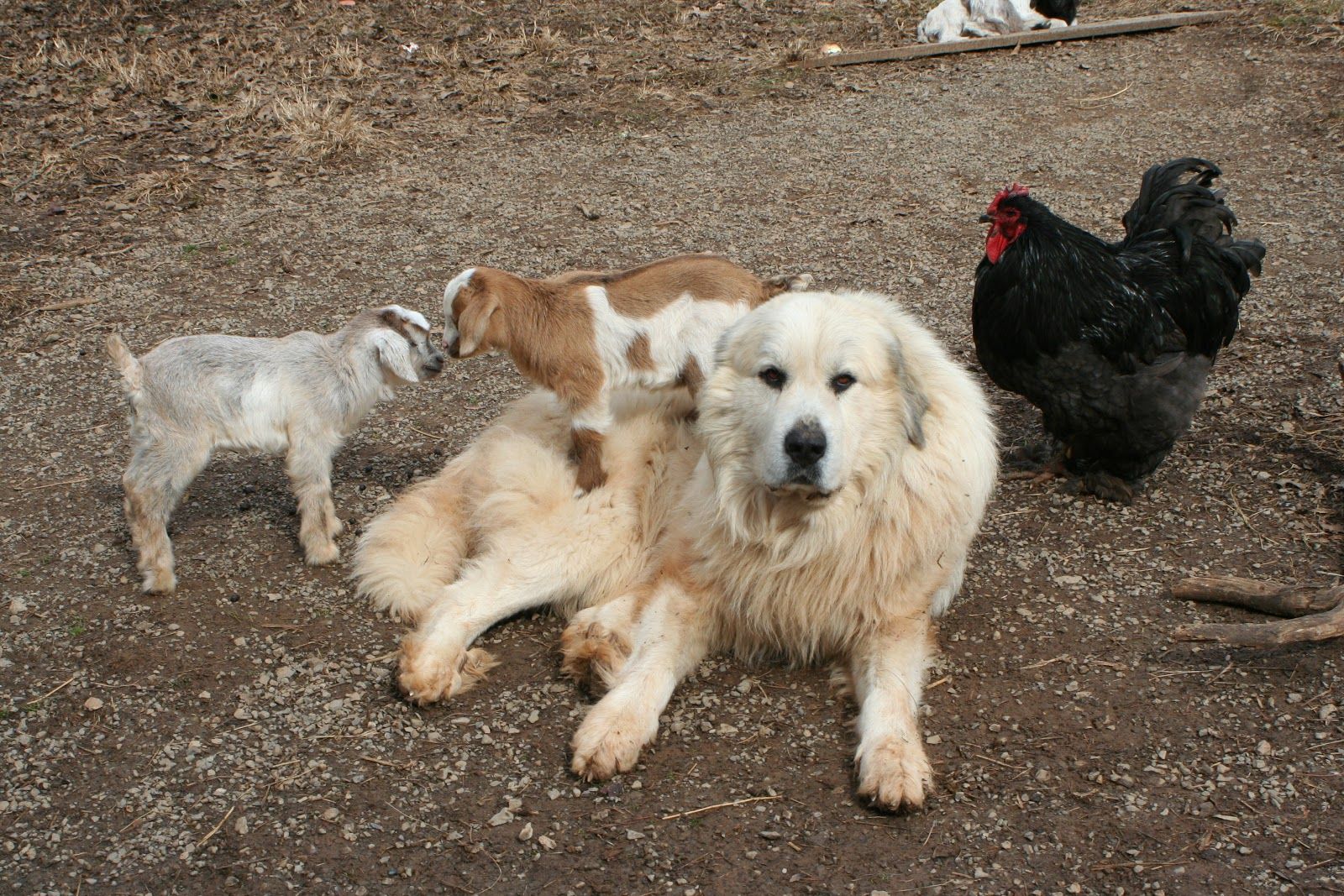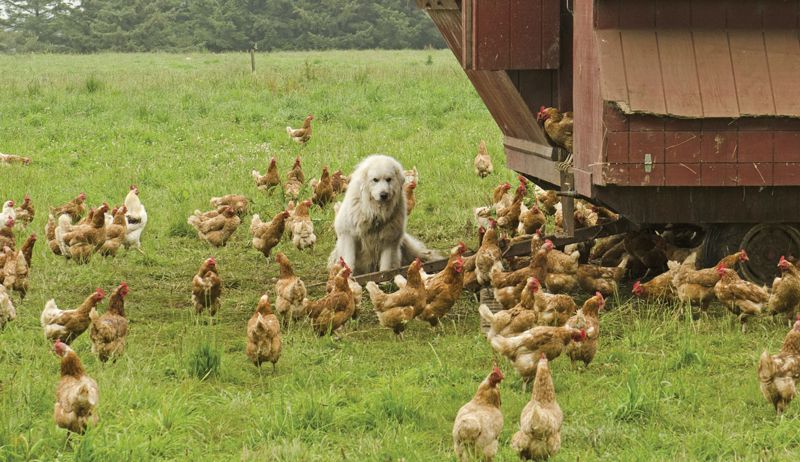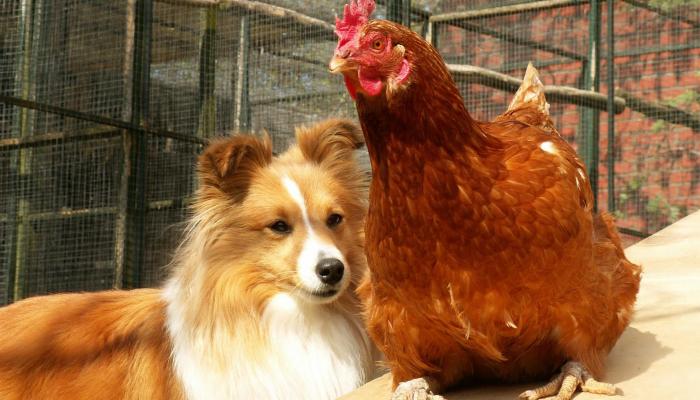If you're a proud owner of Great Pyrenees and chickens, you might have witnessed the seemingly innate connection between these gentle giants and your feathered friends. The big question often asked is, "Will Great Pyrenees protect chickens?" Let's dive into the fascinating world of this majestic breed and discover the nuances of their guardian instinct.

The Natural Guardian Instinct
At the heart of the Great Pyrenees breed lies an extraordinary natural guardian instinct—a characteristic deeply ingrained in their history as livestock protectors in the rugged Pyrenees Mountains. These majestic dogs were selectively bred for centuries to stand as vigilant sentinels, defending herds against formidable predators. This ancient heritage has woven an intrinsic commitment to protection into the very fabric of the Great Pyrenees.
Picture the vast, open landscapes of the Pyrenees Mountains, where these dogs once roamed, forming an unbreakable bond with the animals they watched over. The natural guardian instinct isn't merely a learned behavior; it's a timeless legacy that has been passed down through generations, shaping the breed into the stalwart protectors they are today.

Great Pyrenees and Chickens: A Natural Connection
Now, imagine bringing this noble breed into the context of your backyard, where the fluttering presence of chickens captures their attention. It's a natural connection that transcends mere cohabitation. Great Pyrenees, known for their gentle demeanor, forge a unique bond with the feathery members of your flock. This connection is a testament to the breed's adaptability and their ability to distinguish between friends and potential threats.
The harmony that unfolds between Great Pyrenees and chickens is a delicate dance—a choreography of guardianship where the large, majestic dog assumes the role of protector while maintaining a gentle touch with its charges. This natural connection fosters an environment of trust, and the mere presence of a Great Pyrenees becomes a reassuring presence for both the chickens and their human caretakers.
Training the Great Pyrenees to Protect Chickens
While the natural guardian instinct is the backbone of their protective nature, the successful integration of Great Pyrenees into a chicken-keeping environment demands thoughtful agility training. Early exposure and positive reinforcement are the cornerstones of shaping their behavior. These intelligent dogs respond remarkably well to consistent, reward-based training.
Teaching commands such as "stay" and "leave it" takes center stage in honing their protective skills. Training sessions should be viewed not only as a means to enforce commands but as opportunities to strengthen the bond between the happy dog and its human family. The result is a Great Pyrenees that understands its role as a guardian and embraces it with unwavering dedication.
In essence, training is the bridge that connects the natural guardian instinct with actionable behaviors, ensuring that the protective capabilities of Great Pyrenees are finely tuned to the specific needs of your chicken flock. It's the art of channeling their innate instincts into a harmonious partnership that serves to fortify the safety of your feathered companions.
In the next sections, we will delve deeper into common misconceptions surrounding Great Pyrenees, the challenges that may arise during training, and the seamless integration of these majestic dogs into your flock. Through each step, the narrative will unfold, painting a vivid picture of how Great Pyrenees stand not just as guardians but as integral members of a thriving, interconnected community.
Common Misconceptions
In the world of poultry guardianship, Great Pyrenees often find themselves surrounded by a cloud of misconceptions. One prevalent myth is the perception of these majestic dogs as overly aggressive. The reality, however, paints a different picture. Great Pyrenees, when properly trained and socialized, are remarkably gentle. Their protective instincts are nuanced, and they discern between friend and foe with remarkable precision.
Another misconception revolves around the perceived difficulty of training Great Pyrenees. Some may assume that their independent nature makes them resistant to commands. On the contrary, these intelligent dogs thrive in environments where training is consistent and rewards are abundant. Understanding the unique balance of firmness and encouragement is the key to unlocking their full potential as guardians.
Challenges in Training

Training any dog presents its challenges, and Great Pyrenees are no exception. One common challenge arises from their independent streak. These dogs, bred to make decisions in the absence of human guidance, may display a level of autonomy that requires patient and persistent training methods. Consistency is paramount, and the use of positive reinforcement techniques proves highly effective in overcoming such challenges.
Distractions can be another hurdle. The keen senses of a Great Pyrenees, finely tuned to detect potential threats, may lead to moments of distraction during training sessions. Understanding and working with their heightened awareness is crucial. Training in controlled environments, gradually introducing stimuli, and reinforcing positive behaviors contribute to overcoming these distractions.
Integrating Great Pyrenees into Your Flock
The seamless integration of Great Pyrenees into a chicken flock is a delicate process that demands careful consideration. While their protective instincts are commendable, an abrupt introduction may cause stress for both the dogs and the chickens. The key is gradual acclimatization.
Start by allowing the dogs to observe the flock from a distance. This initial phase fosters familiarity without direct interaction. As the comfort level grows, supervised introductions become the next step. It's during these monitored encounters that the groundwork for a harmonious relationship is laid.
Setting clear boundaries is essential. Define spaces for the chickens and establish a zone where the dogs can observe without direct access. This creates a controlled environment where the two species can coexist. Consistent monitoring during the integration phase ensures that any signs of stress or discomfort are promptly addressed.
As the bond between Great Pyrenees and chickens solidifies, the result is a symbiotic relationship. The dogs assume their role as protectors, and the chickens, in turn, benefit from the watchful presence of their guardians. It's a testament to the adaptability of Great Pyrenees, showcasing their ability to seamlessly integrate into the intricate tapestry of a backyard flock.
In the subsequent sections, we will explore real-life case studies that highlight the success stories of Great Pyrenees protecting chickens, delve into the intricacies of understanding predatory threats, and discuss the multifaceted nature of canine guardianship. Each layer of this narrative unfolds, revealing the depth of the bond between Great Pyrenees and their feathered charges.
Case Studies
Real-life scenarios provide a vivid testament to the remarkable protective capabilities of Great Pyrenees when it comes to safeguarding chickens. Consider the case of a small homestead facing nightly visits from cunning foxes. Introducing a Great Pyrenees into the equation resulted in a notable decline in predation attempts. The mere presence of the dog, coupled with its bursts of vigilant barking, deterred the foxes and ensured the safety of the flock.
In another instance, a determined raccoon attempted to breach a chicken coop, posing a threat to both eggs and poultry. The timely intervention of a Great Pyrenees disrupted the raccoon's efforts, showcasing the breed's keen awareness and ability to identify potential threats. These case studies underscore the practical effectiveness of Great Pyrenees as reliable guardians, demonstrating their adaptability in addressing various challenges faced by chicken keepers.
Understanding Predatory Threats
To comprehend the role of Great Pyrenees in chicken protection, a nuanced understanding of predatory threats is essential. Chickens face a myriad of potential dangers, ranging from ground-dwelling predators like foxes and raccoons to aerial threats posed by birds of prey. Great Pyrenees, with their acute senses and innate guardian instincts, actively deter these threats.
The formidable size and imposing presence of Great Pyrenees alone act as deterrents to ground predators. Their bursts of activity, triggered by a heightened sense of alertness, send a clear message to potential threats: this territory is guarded. Additionally, their vocal expressions, manifested through deep barks, contribute to creating an environment where predators think twice before approaching.
The intricacy of understanding predatory threats lies in recognizing the distinct behaviors of various predators. Great Pyrenees, through years of selective breeding and natural evolution, have developed an intuitive grasp of these behaviors. It's this nuanced understanding that allows them to proactively intervene and protect their charges, making them indispensable allies in the battle against potential threats to your chicken flock.
The Perplexity of Canine Guardianship
The guardian role assumed by Great Pyrenees is not a simplistic one—it's a multifaceted and often perplexing duty. On one hand, their gentle nature with chickens is heartwarming, emphasizing their ability to differentiate between the vulnerable creatures they protect and potential threats. On the other hand, their bursts of activity, characterized by assertive barking and vigilant postures, add a layer of unpredictability that serves as a powerful deterrent.
This perplexity is a unique feature of canine guardianship that contributes to their effectiveness. It's the juxtaposition of gentleness and assertiveness, friendliness and protectiveness, that creates a dynamic environment in which predators are kept at bay. The perplexity of canine guardianship, embodied by Great Pyrenees, ensures not only the safety of chickens but also the creation of a secure and harmonious ecosystem within the homestead.
As we proceed, we will explore the broader aspects of the human-canine bond, shedding light on how the emotional connection between owners and Great Pyrenees further enhances their protective instincts. The narrative unfolds, revealing the intricate dance between these majestic dogs and the feathered charges they watch over.

Great Pyrenees: More Than Guardians
Beyond their role as formidable guardians of chicken flocks, Great Pyrenees offer a spectrum of benefits that transcend traditional expectations. These majestic dogs, with their gentle demeanor and imposing presence, contribute to the holistic well-being of a farm or homestead. Their role extends beyond mere protection, encompassing companionship, deterrence of intruders, and even assistance in managing other aspects of farm life.
Consider the calming effect a Great Pyrenees has on the overall environment. Their serene presence influences the behavior of other animals, creating a harmonious atmosphere. The adaptability of Great Pyrenees to diverse tasks showcases their versatility, making them more than just guardians—they become integral members of the farm community.
Burstiness in Guardian Behavior
The burstiness observed in the behavior of Great Pyrenees is a fascinating aspect of their guardian instincts. These bursts of activity, manifested through sudden and assertive actions, serve as powerful deterrents to potential threats. Picture a moonlit night where the sudden eruption of deep, resonant barks echoes across the farm. This burst of sound isn't mere noise; it's a strategic display of vigilance that keeps predators at bay.
The burstiness in their behavior is an adaptive response honed through centuries of selective breeding. It's the unpredictable nature of their actions that confounds potential threats, creating an environment of dynamic defense. Burstiness, therefore, isn't a sign of erratic behavior but a calculated strategy employed by Great Pyrenees to actively discourage predators and ensure the safety of their charges.
The Human-Canine Bond
Central to the effectiveness of Great Pyrenees as guardians is the profound bond they form with their human companions. This bond is more than a mere connection—it's a deep understanding forged through shared experiences, training sessions, and moments of mutual trust. The strength of the human-canine bond amplifies the protective instincts of Great Pyrenees, creating a symbiotic relationship that goes beyond the surface level of obedience.
As a farmer or homesteader, the bond with your Great Pyrenees becomes a cornerstone of successful chicken protection. This connection enhances communication, allowing for nuanced interactions that foster a sense of partnership. The emotional investment in the well-being of the flock becomes a shared responsibility, and the result is a Great Pyrenees that doesn't just guard chickens out of instinct but out of a genuine commitment to the human-canine bond.
In the succeeding sections, we will draw the narrative to a close by summarizing key points, reiterating the unique protective qualities of Great Pyrenees, and addressing common questions in our FAQs. As we approach the conclusion, the intricate dance between these majestic dogs and their feathered charges unfolds, illustrating the depth of the human-canine bond and the effectiveness of the Great Pyrenees as guardians of the farmstead.

Conclusion
In conclusion, the answer to whether Great Pyrenees will protect chickens is a resounding yes. Their natural guardian instinct, combined with proper training and integration, makes them exceptional protectors of poultry. The perplexity and burstiness in their behavior add layers of complexity to their effectiveness, creating a robust defense against predatory threats.
FAQs
- Can Great Pyrenees protect against all types of predators?
- Great Pyrenees are particularly effective against ground predators like foxes and raccoons. While they can deter birds of prey, additional precautions may be necessary.
- Are Great Pyrenees good with children?
- Yes, Great Pyrenees are known for their gentle nature and make excellent companions for families, including children.
- How do I train my Great Pyrenees to protect chickens?
- Early training using positive reinforcement, consistent commands, and supervised interactions with chickens are essential.
- Do Great Pyrenees require a lot of exercise?
- While they are not hyperactive, regular exercise is important to keep them healthy and mentally stimulated.
- Can Great Pyrenees live in warmer climates?
- Yes, with proper care and access to shade, Great Pyrenees can adapt to warmer climates.




